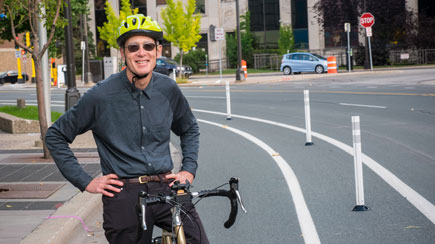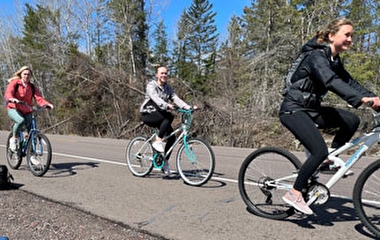Known for bridging the gap between academics and the community in his research into nonmotorized transportation, CTS Scholar Greg Lindsey has been named the winner of the 2019 University of Minnesota President’s Community-Engaged Scholar Award.
The award recognizes University faculty who demonstrate academically relevant work that advances scholarship in one or more academic disciplines, is conducted in partnership with external entities, and addresses critical societal issues. Lindsey was chosen from six finalists by a committee of peers from throughout the University and honored at an April 4 ceremony.
Lindsey works in the urban and regional planning area of the Humphrey School of Public Affairs. His current research involves analysis of active travel, or nonmotorized transportation, with a focus on bicycle and pedestrian traffic and infrastructure. His work has had significant impacts and is shaping the ways state and local governments plan for active travel across the country.
The Minnesota Department of Transportation (MnDOT) and CTS have worked with Lindsey for more than a decade on research projects to build evidence to inform policymaking and guide investments in active travel.
“In 2009, CTS awarded a grant to Greg for exploratory work to measure and characterize nonmotorized traffic in selected Minnesota communities,” says Laurie McGinnis, CTS director. “The success of this work led to a series of three MnDOT research projects, collectively known as the Minnesota Bicycle and Pedestrian Counting Initiative.”
At least 10 public agencies, including MnDOT, the Minnesota Department of Natural Resources (DNR), and Hennepin County, have implemented new monitoring programs to measure bicycling and pedestrian traffic volumes based on research by Lindsey and his students.
Several of Lindsey’s faculty colleagues nominated him for the award, noting that his work is nationally recognized as an “exemplar of community-engaged scholarship.” Some of Lindsey’s former students also praised him for his approach to integrating research, teaching, and community outreach that helped them succeed in their studies and in the job market.
One example is Darin Newman, principal planner with the DNR Parks and Trails Division. “With Professor Lindsey’s direction, my capstone team developed a research plan for monitoring use of Minnesota state trails,” Newman says. “I am now responsible for implementing this plan at the DNR to collect systemic trail use data that is critical for better management and evidence-based decision making to guide investments in infrastructure and operations for the highest benefit to the public.”
Lindsey says he’s grateful for the recognition. “I am most gratified by the work my students have done in the community, and to build our field. I am fortunate to have had these types of opportunities and to have worked with bright, committed students and dedicated public servants,” he says. “My job has been a gift. I am extremely grateful to the Humphrey School, CTS, and the University of Minnesota for the opportunities they have provided.”
(Adapted with permission from the Humphrey School of Public Affairs.)




